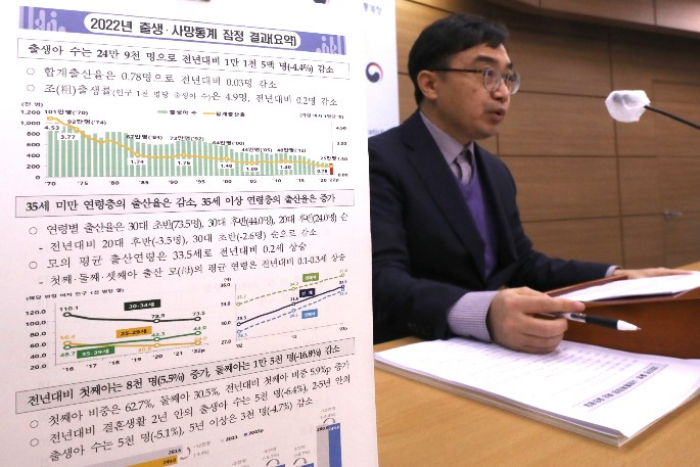South Korea saw its fertility rate, which has been already the world’s lowest in the past few years, hit its historic low of 0.78 last year, adding to the woes of Asia’s fourth-largest economy that is rapidly heading toward a super-aged society.
According to data released by Statistics Korea on Wednesday, the country’s total fertility rate in 2022 was recorded at 0.78, down 0.03 from the previous record low rate. The total fertility rate measures the average number of children a woman bears in her lifetime.
This is the lowest-ever fertility rate since the Republic of Korea was established in 1948, separated from its North Korean neighbor. It has been on a steady decline for six years in a row since 2015 when it hit 1.24. It is nearly half the rate recorded in 2012 when the country’s total population topped 50 million for the first time, and the rate reached 1.30.
The country’s number of babies born was also halved to a fresh low of 249,000 over the same period. It was down 4.4% from the previous record low in 2021.
Korea’s fertility rate was again the lowest among the Organization for Economic Co-operation and Development’s (OECD) 38 member countries last year. The OECD average fertility rate was 1.59, more than double Korea’s fertility rate. France, Australia and Italy recorded 1.79, 1.58 and 1.24, respectively.
The world’s fastest decline in birthrates will further weigh on Asia’s fourth-largest economy, which is already an aged society.
The ideal fertility rate for Korea is at least 2.1 to maintain the country’s population stable at 52 million, according to experts. But the latest trend gives a grim outlook on the country’s population.
The rapid decline in birthrates comes after the country’s young people are becoming more reluctant to get married or have babies in this highly competitive society, where economic burden keeps growing with high education fees and home prices.
For every 1,000 Korean women aged between 35 and 39, 43.5 babies were born in 2022, up 0.5 from the previous year, whereas 24 and 73.5 babies were born for 1,000 women in their late 20s and late 30s in 2022. Each figure was down from 27.5 and 76.1 in 2021, indicating the average age of women giving their first births rose.
The average age of mothers giving birth stood at 33.5 in 2022, up 0.2 from a year ago.
Deaths, however, outpaced births in 2022, resulting in 123,800 in terms of natural decrease, calculated by subtracting the number of deaths per 1,000 people from the number of births.
The number of deaths last year came to 372,800, up 17.4% from a year ago. Korea first reported more deaths than births in 2020.
Write to Jin-gyu Kang and Jung-hwan Hwang at
josep@hankyung.com
Sookyung Seo edited this article.


